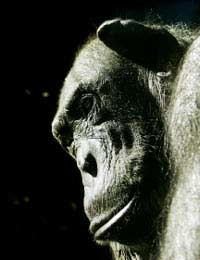Non-Coding DNA in Humans

If you think about the several billion genetic letters that make up our genome, you might be surprised to learn that some parts of DNA were traditionally believed to be 'junk,' in the sense that they had no real functional purpose.
It's now incredible to learn that what was once considered 'junk' DNA – with no useful purpose to code for proteins – is actually more functional than we once thought.
A recent study looked at the genomes of humans and chimpanzees – among others. Researchers compared the genomes and the results suggested that human evolution might actually have been guided by parts of the genome that were traditionally considered to be 'junk' DNA.
Studying the Human Genome
A group of scientists investigated the huge non-coding parts of the human genome to find some of the sequences that may have experienced a functional change throughout human evolution. What the scientists were seeking was a sequence that showed a higher number of base pairs in humans than in our related primates.They found a sequence called HACNS1. This sequence sounds complicated, but it is a sequence in vertebrate species that shows many variations since the evolution of humans and chimpanzees many millions of years ago. In fact, we know that humans have enormous similarity to chimpanzees in terms of the genome.
Humans and Apes
In this sense, it was unexpected for researchers to find that there were sixteen base pairs that varied throughout evolution. These 'junk' bits are now thought to have played an important role in influencing gene expression, which led to key morphological differences in humans versus similar animals. Rather than being junk, these non-coding parts of DNA have important regulatory functions that can turn genes on or off.Functional DNA
In fact, researchers found that the HACNS1 sequence triggered genes in growing mouse limbs. However, the chimpanzee sequence that was a variation on this human gene did not trigger the same changes in the mouse limbs.What was particularly interesting was that the human sequence primarily affected the thumb and toe, which could represent the evolutionary changes and adaptive modifications in human parts such as the ankle and thumb. While the research is still quite new and in the early stages, it does provide a fascinating suggestion that parts of our DNA may be a lot more useful than we once thought.
Preliminary Research
The research is exciting because it gives us clues about the importance of non-coding DNA that was once considered junk and useless. We now know that it might have been integral in driving key evolutionary changes such as the development of uniquely human parts, all of which were important to providing an evolutionary advantage to humans.However, further research is still needed before any firm conclusions can be made about the role of HACNS1 or other sequences in DNA. Evolution is still filled with many gaps, but our increasing knowledge about the human genome and DNA is slowly helping to fill in those gaps and enlighten us on how humans evolved as well as how other species evolved. Hopefully, we can eventually fill in more of the knowledge gaps about evolution and human DNA.
- Privacy and New DNA Testing Methods
- New Forms of DNA Fingerprinting
- DNA and Other Life Forms
- DNA Firms and Bio Terrorism
- Using DNA Testing for In Vitro Fertilisation
- Childhood Viruses and Inherited DNA
- Resurrecting the DNA of Extinct Animals
- DNA Studies and the Evolution of Birds
- The Effect of Famine on Foetal DNA


Re: How was DNA Discovered?
DNA is not a real thing, the earth is flat, the sun is blue
Re: An Overview of DNA Functions
I tried to extract DNA from my refrigerator, now I have no refrigerator and my food is rotting.
Re: The Properties of DNA
what are 5 characteristics of DNA?
Re: How was DNA Discovered?
betty for the last time im trying to sleep bugger of babe
Re: How was DNA Discovered?
It is past you bedtime winnie pleas go to bved now or no france for you go back to easter island looser!!!
Re: How was DNA Discovered?
My bed time is at 9:00 and it is 9.01 in indea at the moment> i am sooooooooo naughty
Re: How was DNA Discovered?
ICE ICE DAVEY
Re: How was DNA Discovered?
This sorkis absalutely propostuous I found out about DNAfirst these loosers lied
Re: How was DNA Discovered?
meow
Re: How was DNA Discovered?
this workis realy interresting i would love to disscus more about this with you